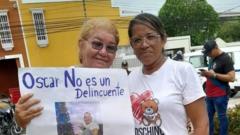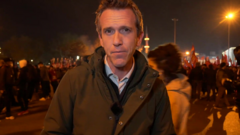Gertrudis Pineda’s plea for her son Oscar, among 238 deported Venezuelans held at Cecot prison, reveals a troubling narrative of human rights violations amidst a politically charged backdrop.
**Venezuelan Families Demand Justice for Deported Sons in El Salvador Mega-Prison**

**Venezuelan Families Demand Justice for Deported Sons in El Salvador Mega-Prison**
A mother's heartache exposes a controversial deportation scheme involving Venezuelans and a notorious Salvadoran prison.
Mother’s Fight to Free Son Trapped in El Salvador’s Mega-Prison
Venezuelan mother Gertrudis Pineda’s life has been turned upside down following the deportation of her son, Oscar, to a maximum-security prison in El Salvador known as Cecot. Oscar, who was making a living in Dallas by laying carpets, is now facing dire conditions behind bars with the label of being a gang member. This twist of fate came after U.S. Immigration and Customs Enforcement (ICE) agents detained him and other Venezuelans, a dismissal of legal protocols as per a federal judge's orders.
From her home in Zulia state, the 1,800-km distance only amplifies Gertrudis' despair, worsened by a lack of information regarding her son's health and safety. These deportations, justified by U.S. authorities as targeting gang members, have drawn heavy criticism amidst allegations that many have no criminal records in the U.S. or Venezuela.
Human rights advocates argue that Cecot functions as a "black hole" of rights, with El Salvador's government facing significant backlash domestically and internationally. Activists like immigration expert Napoleon Campos call for judicial intervention, stating the treatment of the deported is unconstitutional. Meanwhile, ongoing protests in Venezuela aim to amplify the voice for those trapped in the controversial imprisonment system.
Trial lawyer Jaime Ortega is attempting to negotiate the release of the detainees, noting a troubling lack of transparency over their deportation terms from the U.S. Ortega insists the men should be relocated to immigration centers rather than enduring the harsh conditions of a supermax facility.
As President Nayib Bukele’s administration continues its crackdown on gangs, hailed by supporters for reducing crime, it faces mounting scrutiny over its methods. Critics, including locals, voice concerns that innocent people are wrongly detained in the larger campaign against gang influence—a reality that haunts families like Gertrudis’. She sees the deportations as akin to kidnapping, fervently believing that if her son has committed any crime, he should face justice in Venezuela, not El Salvador.





















